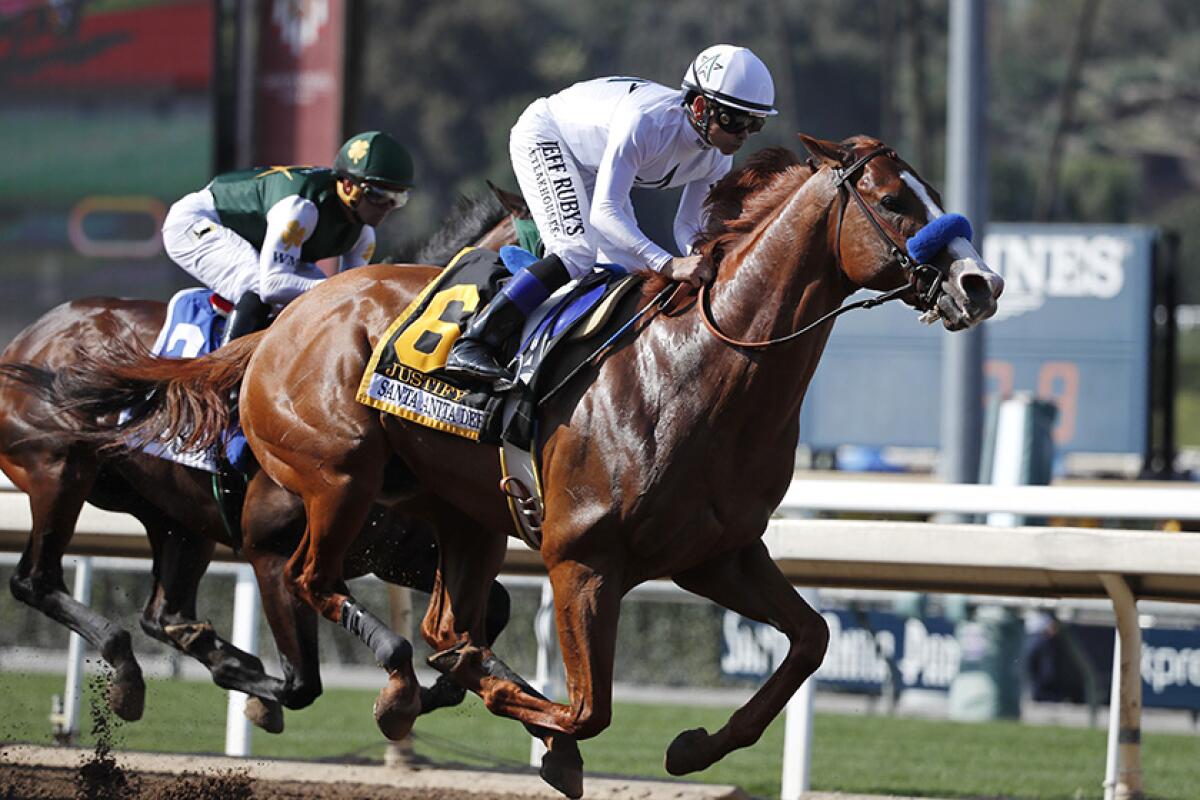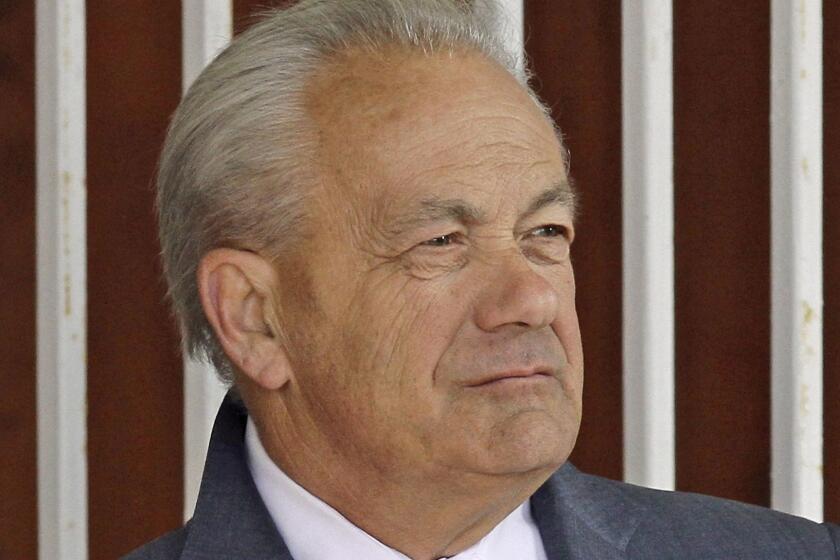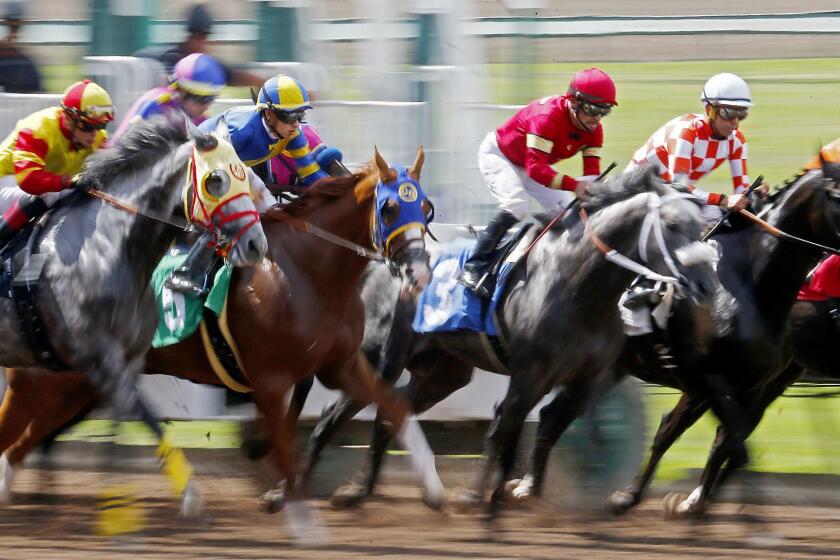Justify failed drug test because of contaminated feed, California racing board says

- Share via
Justify, who dominated the equine world last year when he became the 13th winner of the Triple Crown, has thrust horse racing back into an unwelcome spotlight after it was reported that the colt failed a drug test following his victory in the Santa Anita Derby.
Justify tested positive for scopolamine, a compound commonly found in jimson weed, a wild-growing plant, which according to veterinarians has little to no effect on performance. Justify was not alone at Santa Anita, as a total of seven horses in five different barns all tested positive at the same time, indicating it was not some random case of a trainer seeking an edge.
In this case, the trainer would be Hall of Famer Bob Baffert.
The cases against Justify and the other six horses were dropped after the California Horse Racing Board determined that the positive tests were caused by simple feed contamination. The failed drug test was first reported by the New York Times. Technically, the case should be classified as a poisoning rather than a drugging because of how the drug was ingested.
The timing of the positive test and how it was handled has become the subject of much discussion in a sport that has had more than its share of scrutiny this year, including the death of 30 horses at Santa Anita and the race-day disqualification of a Kentucky Derby winner, the first time that has happened in 145 years.
Chuck Winner, who was the chairman of the CHRB at the time, on Thursday cited “overwhelming evidence that Justify, along with six other horses in four different barns at Santa Anita, ingested scopolamine from jimson weed which was present in the hay that had been delivered to the barns.”
A judge in Alameda County denied a request for a temporary restraining order that would have allowed Jerry Hollendorfer to race at Golden Gate Fields.
“It would have been a complete miscarriage of justice for the CHRB to have taken action against Justify or Baffert, knowing full well that the horse was poisoned by an environmental contaminate and not injected with a substance,” Winner said.
Even if the process had moved at rocket speed and the seven horses had been found in violation, Justify would still not have been disqualified as the winner of the Santa Anita Derby or denied a spot in the Kentucky Derby.
The drug was originally classified in California as a “3b,” which if detected could lead to disqualification. But the Assn. of Racing Commissioners International (RCI), which sets industry standards including drug limits for horses and greyhounds, had reclassified the drug as a less serious “4c,” for which violations don’t result in disqualifications.
California automatically adopts all RCI rules unless the board votes otherwise. The CHRB website — because of a clerical oversight, according to Winner — had not updated the classification, and because the board hadn’t voted for a change, scopolamine was technically a 4c in the state.
“Scopolamine has some historic use in treating abdominal discomfort or colic,” said Dr. Mary Scollay, executive director of the Racing Medication and Testing Consortium. “Today it has minimal application in the horse.”
Scollay also said the drug is not a performance enhancer and the amount, 300 nanograms, while above the accepted limit, provides no more clues.
“You can not discern intent from concentration,” Scollay said.
Dr. Rick Arthur, equine medical director of the CHRB, said the drug can be used as a bronchodilator, but “the pharmacological effect is nil.”
The Los Angeles County Fair thoroughbred meet, an end-of-summer/start-of-fall staple since the 1930s, might be making its final run during September this year.
Arthur called this contamination “unusual but not unprecedented,” and referred back to March 2013, when 48 instances of zilpaterol violations were thrown out because of feed contamination. Zilpaterol is essentially used to increase the size of cattle. In that case, shipments got mixed up and cattle feed was delivered to horse barns.The first horse to test positive came from a March 1 race and the CHRB decided to throw out the cases on March 26.
Word of the positive test also awakened animal rights advocates, who escalated the rhetoric in a sport that has had 13 weeks without a racing death in Southern California.
“Bob Baffert apparently drugged and harmed Justify — a horse that was completely at his mercy,” said Kathy Guillermo, senior vice president of PETA. “Baffert should be suspended and held accountable, and Justify should be disqualified from the Triple Crown victory.”
Reaching a decision in medication or doping cases can often drag on for months, if not longer. Baffert was informed about the positive test nine days before the Kentucky Derby.
Samples are often retested and, in this case, the second result on Justify’s sample did not come back until three days after the Kentucky Derby. After an investigation by the CHRB staff, the board’s executive director, Rick Baedeker, and Arthur recommended that the cases be thrown out.
“California law mandates that test results must remain confidential unless and until a complaint is filed and a complaint can only be filed at the end of an investigative process,” Winner said.
Winner said he learned about the investigation about a week before last year’s Aug. 23 board meeting. At the board meeting, in closed executive session, the charges were dropped, he said.
The last instance of a scopolamine violation in California was in 2007 for trainer Jerry Hollendorfer. The horse raced on Feb. 19, 2007, and was disqualified more than a year and a half later, on Oct. 19, 2008.
The names of the other trainers who had horses test positive last year were not made public.
“I unequivocally reject any implication that scopolamine was ever intentionally administered to Justify, or any of my horses,” Baffert said. “Following the Santa Anita Derby, Justify raced in three different jurisdictions during his Triple Crown run — Kentucky, Maryland and New York. He passed all drug tests in those jurisdictions. I call on the relevant testing agencies in those jurisdictions to immediately release information related to Justify’s test results.”
Craig Robertson, Baffert’s Kentucky-based attorney, said he was disappointed the issue has resurfaced.
“In my mind, this has been done a year and a half ago,” Robertson said. “The truth is our friend in this case. We have nothing to hide. It’s a simple case of environmental contamination. It’s certainly not performance-enhancing. In our mind, we’ll deal with it now and make sure the public has the whole story and the truth and then it’s over.”
More to Read
Go beyond the scoreboard
Get the latest on L.A.'s teams in the daily Sports Report newsletter.
You may occasionally receive promotional content from the Los Angeles Times.













